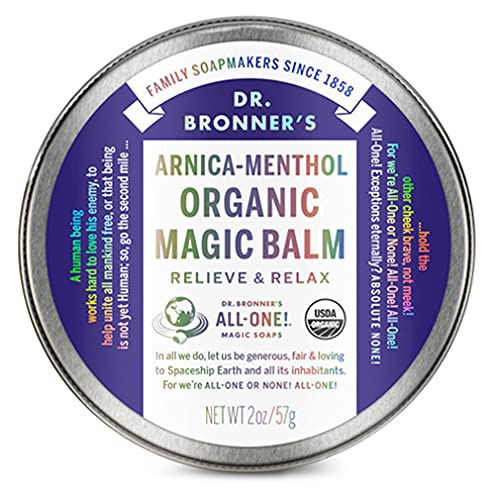

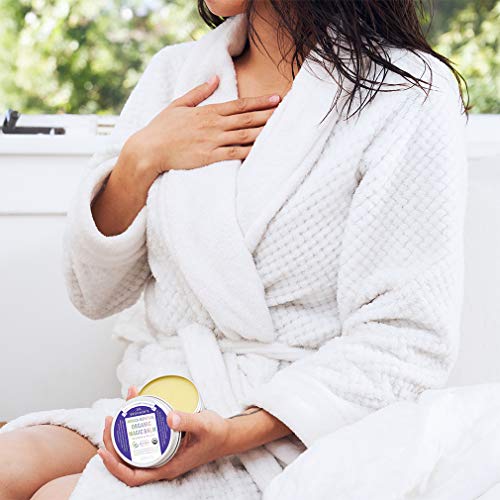
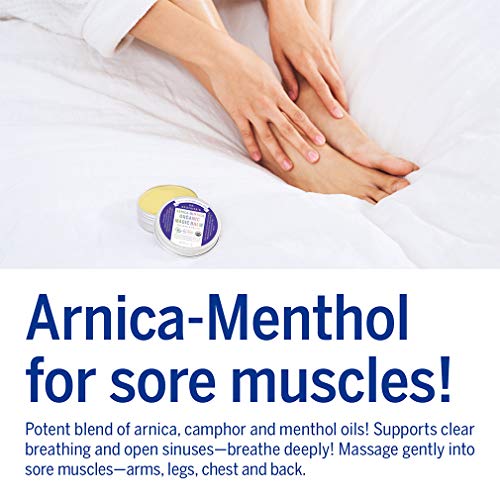
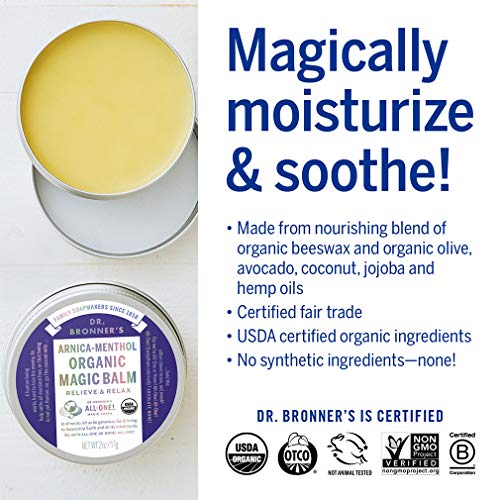
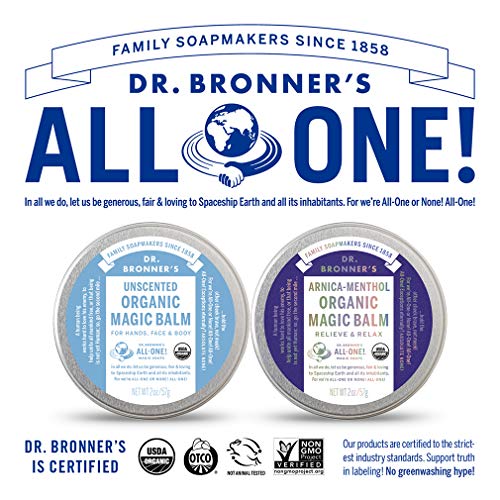

Dr. Bronner's Organic Muscle Balm - Relieves Sore Muscles, Moisturizes Skin - 2oz Arnica-Menthol


Menthol
High RiskMenthol is a scent ingredient naturally found in mint oils. It is primarily used for its cooling sensation and fragrance properties in various products, including personal care and cosmetics, providing a characteristic minty aroma.
Sustai Insights
Menthol offers functional benefits such as providing a cooling effect and enhancing fragrance in formulations. However, it has a high allergenic potential and can cause irritation in sensitive individuals. Regulatory agencies have noted restrictions on its use due to these safety concerns. Environmentally, menthol poses low risks, but cumulative exposure from multiple sources can occur. Overall, menthol is considered high risk due to its allergenic properties and potential for irritation, highlighting the need for careful usage and consideration of alternatives.
Mentha Piperita (Peppermint) Oil
High RiskMentha piperita (peppermint) oil is a volatile oil extracted from the leaves of the peppermint plant, known for its strong aroma and flavor. It is commonly used in cosmetics and personal care products for its cooling properties and fragrance enhancement.
Sustai Insights
Peppermint oil offers functional benefits such as antimicrobial properties and a soothing sensation on the skin. However, it is associated with a high potential for allergies and skin irritation. Regulatory bodies impose certain restrictions on its use due to these concerns. The overall risk level is assessed as high, warranting caution in usage, especially for sensitive populations. Alternatives like spearmint oil may provide similar benefits with potentially lower irritation risks.
Cannabis Sativa (Hemp) Seed Oil
Medium RiskCannabis sativa (hemp) seed oil is extracted from the seeds of the hemp plant. It is rich in essential fatty acids and is commonly used in cosmetic and health products for its moisturizing properties and potential nutritional benefits.
Sustai Insights
Hemp seed oil offers functional benefits such as being a moisturizing agent and providing essential fatty acids. It is typically sustainably sourced and biodegradable. Health risks are low, with minimal concerns regarding carcinogenicity, allergies, and reproductive toxicity. Regulatory warnings exist due to moderate use restrictions. Environmental risks are also low, indicating it does not significantly contribute to pollution or bioaccumulation. Overall, the ingredient is assessed as medium risk, and safe usage practices should be followed. Alternatives include other plant-based oils that offer similar benefits.
Arnica Montana
Medium RiskArnica montana is a flowering plant commonly used in cosmetic formulations for its anti-inflammatory and analgesic properties. It is primarily utilized in topical applications aimed at alleviating pain, bruising, and swelling.
Sustai Insights
Arnica montana offers functional benefits as an anti-inflammatory agent, making it valuable in pain relief creams. However, it poses moderate allergy risks and can irritate sensitive skin. Although it is not classified as a carcinogen or reproductive toxin, regulatory bodies advise caution in its use, particularly in high concentrations. Overall, the risk assessment indicates a medium level of concern, and users should adhere to recommended usage levels to mitigate potential adverse effects. Alternatives like calendula or chamomile may provide similar benefits with lower risk profiles.
Simmondsia Chinensis (Jojoba) Seed Extract
Low RiskSimmondsia chinensis (jojoba) seed extract is a wax ester derived from the seeds of the jojoba plant, commonly used in cosmetic and personal care products for its emollient properties. It helps to moisturize and soothe the skin, making it a popular ingredient in formulations for dry or sensitive skin.
Sustai Insights
Simmondsia chinensis (jojoba) seed extract offers functional benefits as an effective moisturizer and skin conditioner, being biodegradable and sustainably sourced. Health risks are minimal, with low concerns regarding carcinogenicity, allergies, or reproductive toxicity. Environmental risks are also low, with no significant pollutant potential. Regulatory status is compliant, with no current restrictions. Overall, it is assessed as low risk, promoting safe usage practices with no significant adverse effects reported.
Persea Gratissima (Avocado) Oil
Low RiskPersea gratissima (avocado) oil is derived from the fruit of the avocado tree. It is commonly used in cosmetic formulations for its moisturizing properties, serving as an emollient that enhances skin hydration and improves product texture.
Sustai Insights
Avocado oil offers functional benefits as a moisturizer and emollient, known for its ability to nourish and hydrate the skin. It is sustainably sourced and biodegradable. Health risks are minimal, with low concerns regarding carcinogenicity, allergies, and reproductive toxicity. Environmental risks are also low, with no significant pollutant or bioaccumulation potential. Regulatory bodies have not issued warnings against its use. Overall, the ingredient is assessed as low risk, making it a safe choice for cosmetic applications.
Olea Europaea (Olive)
Low RiskOlea europaea (olive) is derived from the fruit of the olive tree, primarily known for its oil. It serves various purposes in personal care products, including moisturizing and antioxidant properties, contributing to skin hydration and protection.
Sustai Insights
Olea europaea (olive) oil has functional benefits such as moisturizing and providing antioxidants. It is sustainably sourced and biodegradable. Health risks are minimal, with low potential for carcinogenicity, allergenicity, or reproductive toxicity. Environmental concerns are also low, without significant pollutant potential. Regulatory status is clear, with no current restrictions. Overall, the risk level is low, and it can be safely used in products with standard precautions. Alternatives like jojoba oil may offer similar benefits.
Cinnamomum Camphora (Camphor) Oil
Low RiskCinnamomum camphora (camphor) oil is a volatile oil derived from the bark of the camphor tree. It is commonly used in various products for its aromatic properties and is known for its potential use as a topical analgesic and antiseptic.
Sustai Insights
Camphor oil offers functional benefits as a potential analgesic and antiseptic, with a low risk of adverse health effects such as carcinogenicity and allergenic reactions. Environmentally, it poses minimal risks, with no significant pollutant or bioaccumulation concerns noted. Regulatory bodies have imposed some restrictions on its use due to safety considerations, but overall, it is regarded as a low-risk ingredient. Safe usage practices should be observed to minimize any potential irritation. Alternatives may include essential oils with similar properties that are sourced sustainably.
Beeswax
Low RiskBeeswax is the purified wax obtained from the honeycomb of honeybees. It is typically used as a thickening agent, emulsifier, or to provide structure in various cosmetic and personal care products.
Sustai Insights
Beeswax offers functional benefits as a natural emulsifier and thickening agent, contributing to product stability and texture. It is biodegradable and sustainably sourced, aligning with eco-friendly practices. Health risks are low, with minimal concerns regarding carcinogenicity, allergies, or irritation. Environmental risks are also low, with no significant pollutant or bioaccumulation issues. Regulatory bodies impose few restrictions, confirming its safety in use. Safe usage practices should be followed, and alternatives like plant-based waxes may be considered for those seeking vegan options. Overall, the risk level associated with beeswax is low.
Tocopherol
Low RiskTocopherols are a class of naturally occurring compounds, primarily known for their role as antioxidants. They are commonly used in cosmetic and skincare products to help stabilize formulations and protect ingredients from oxidative damage.
Sustai Insights
Tocopherols provide functional benefits such as antioxidant protection and skin conditioning. They are generally recognized as safe, with low concerns regarding carcinogenicity, allergies, and reproductive toxicity. However, enhanced skin absorption and potential endocrine disruption are noted. Regulatory bodies have not imposed significant restrictions on tocopherols, categorizing the overall risk as low. Safe usage practices should be observed, and while alternatives exist, tocopherols remain a viable option in formulations.
Cocos Nucifera (Coconut) Oil
Low RiskCocos Nucifera (Coconut) Oil is derived from the kernels of the coconut palm. It is primarily used in cosmetic formulations for its emollient and moisturizing properties, making it suitable for skin and hair care products.
Sustai Insights
Coconut oil serves as an effective moisturizer and emollient, promoting skin hydration and softness. It is sustainably sourced and biodegradable. Health risks are minimal, with low concerns regarding carcinogenicity, allergens, and reproductive toxicity. Environmental impact is also low, as it does not contribute significantly to pollution or bioaccumulation. Regulatory bodies have not issued restrictions on its use. Overall, coconut oil presents a low risk for health and environmental concerns, making it a safe ingredient in cosmetic products.
Menthol
High RiskMenthol is a scent ingredient naturally found in mint oils. It is primarily used for its cooling sensation and fragrance properties in various products, including personal care and cosmetics, providing a characteristic minty aroma.
Sustai Insights
Menthol offers functional benefits such as providing a cooling effect and enhancing fragrance in formulations. However, it has a high allergenic potential and can cause irritation in sensitive individuals. Regulatory agencies have noted restrictions on its use due to these safety concerns. Environmentally, menthol poses low risks, but cumulative exposure from multiple sources can occur. Overall, menthol is considered high risk due to its allergenic properties and potential for irritation, highlighting the need for careful usage and consideration of alternatives.
Simmondsia Chinensis (Jojoba) Seed Extract
Low RiskSimmondsia chinensis (jojoba) seed extract is a wax ester derived from the seeds of the jojoba plant, commonly used in cosmetic and personal care products for its emollient properties. It helps to moisturize and soothe the skin, making it a popular ingredient in formulations for dry or sensitive skin.
Sustai Insights
Simmondsia chinensis (jojoba) seed extract offers functional benefits as an effective moisturizer and skin conditioner, being biodegradable and sustainably sourced. Health risks are minimal, with low concerns regarding carcinogenicity, allergies, or reproductive toxicity. Environmental risks are also low, with no significant pollutant potential. Regulatory status is compliant, with no current restrictions. Overall, it is assessed as low risk, promoting safe usage practices with no significant adverse effects reported.
Persea Gratissima (Avocado) Oil
Low RiskPersea gratissima (avocado) oil is derived from the fruit of the avocado tree. It is commonly used in cosmetic formulations for its moisturizing properties, serving as an emollient that enhances skin hydration and improves product texture.
Sustai Insights
Avocado oil offers functional benefits as a moisturizer and emollient, known for its ability to nourish and hydrate the skin. It is sustainably sourced and biodegradable. Health risks are minimal, with low concerns regarding carcinogenicity, allergies, and reproductive toxicity. Environmental risks are also low, with no significant pollutant or bioaccumulation potential. Regulatory bodies have not issued warnings against its use. Overall, the ingredient is assessed as low risk, making it a safe choice for cosmetic applications.
Olea Europaea (Olive)
Low RiskOlea europaea (olive) is derived from the fruit of the olive tree, primarily known for its oil. It serves various purposes in personal care products, including moisturizing and antioxidant properties, contributing to skin hydration and protection.
Sustai Insights
Olea europaea (olive) oil has functional benefits such as moisturizing and providing antioxidants. It is sustainably sourced and biodegradable. Health risks are minimal, with low potential for carcinogenicity, allergenicity, or reproductive toxicity. Environmental concerns are also low, without significant pollutant potential. Regulatory status is clear, with no current restrictions. Overall, the risk level is low, and it can be safely used in products with standard precautions. Alternatives like jojoba oil may offer similar benefits.
Cannabis Sativa (Hemp) Seed Oil
Medium RiskCannabis sativa (hemp) seed oil is extracted from the seeds of the hemp plant. It is rich in essential fatty acids and is commonly used in cosmetic and health products for its moisturizing properties and potential nutritional benefits.
Sustai Insights
Hemp seed oil offers functional benefits such as being a moisturizing agent and providing essential fatty acids. It is typically sustainably sourced and biodegradable. Health risks are low, with minimal concerns regarding carcinogenicity, allergies, and reproductive toxicity. Regulatory warnings exist due to moderate use restrictions. Environmental risks are also low, indicating it does not significantly contribute to pollution or bioaccumulation. Overall, the ingredient is assessed as medium risk, and safe usage practices should be followed. Alternatives include other plant-based oils that offer similar benefits.
Cinnamomum Camphora (Camphor) Oil
Low RiskCinnamomum camphora (camphor) oil is a volatile oil derived from the bark of the camphor tree. It is commonly used in various products for its aromatic properties and is known for its potential use as a topical analgesic and antiseptic.
Sustai Insights
Camphor oil offers functional benefits as a potential analgesic and antiseptic, with a low risk of adverse health effects such as carcinogenicity and allergenic reactions. Environmentally, it poses minimal risks, with no significant pollutant or bioaccumulation concerns noted. Regulatory bodies have imposed some restrictions on its use due to safety considerations, but overall, it is regarded as a low-risk ingredient. Safe usage practices should be observed to minimize any potential irritation. Alternatives may include essential oils with similar properties that are sourced sustainably.
Mentha Piperita (Peppermint) Oil
High RiskMentha piperita (peppermint) oil is a volatile oil extracted from the leaves of the peppermint plant, known for its strong aroma and flavor. It is commonly used in cosmetics and personal care products for its cooling properties and fragrance enhancement.
Sustai Insights
Peppermint oil offers functional benefits such as antimicrobial properties and a soothing sensation on the skin. However, it is associated with a high potential for allergies and skin irritation. Regulatory bodies impose certain restrictions on its use due to these concerns. The overall risk level is assessed as high, warranting caution in usage, especially for sensitive populations. Alternatives like spearmint oil may provide similar benefits with potentially lower irritation risks.
Beeswax
Low RiskBeeswax is the purified wax obtained from the honeycomb of honeybees. It is typically used as a thickening agent, emulsifier, or to provide structure in various cosmetic and personal care products.
Sustai Insights
Beeswax offers functional benefits as a natural emulsifier and thickening agent, contributing to product stability and texture. It is biodegradable and sustainably sourced, aligning with eco-friendly practices. Health risks are low, with minimal concerns regarding carcinogenicity, allergies, or irritation. Environmental risks are also low, with no significant pollutant or bioaccumulation issues. Regulatory bodies impose few restrictions, confirming its safety in use. Safe usage practices should be followed, and alternatives like plant-based waxes may be considered for those seeking vegan options. Overall, the risk level associated with beeswax is low.
Arnica Montana
Medium RiskArnica montana is a flowering plant commonly used in cosmetic formulations for its anti-inflammatory and analgesic properties. It is primarily utilized in topical applications aimed at alleviating pain, bruising, and swelling.
Sustai Insights
Arnica montana offers functional benefits as an anti-inflammatory agent, making it valuable in pain relief creams. However, it poses moderate allergy risks and can irritate sensitive skin. Although it is not classified as a carcinogen or reproductive toxin, regulatory bodies advise caution in its use, particularly in high concentrations. Overall, the risk assessment indicates a medium level of concern, and users should adhere to recommended usage levels to mitigate potential adverse effects. Alternatives like calendula or chamomile may provide similar benefits with lower risk profiles.
Tocopherol
Low RiskTocopherols are a class of naturally occurring compounds, primarily known for their role as antioxidants. They are commonly used in cosmetic and skincare products to help stabilize formulations and protect ingredients from oxidative damage.
Sustai Insights
Tocopherols provide functional benefits such as antioxidant protection and skin conditioning. They are generally recognized as safe, with low concerns regarding carcinogenicity, allergies, and reproductive toxicity. However, enhanced skin absorption and potential endocrine disruption are noted. Regulatory bodies have not imposed significant restrictions on tocopherols, categorizing the overall risk as low. Safe usage practices should be observed, and while alternatives exist, tocopherols remain a viable option in formulations.
Cocos Nucifera (Coconut) Oil
Low RiskCocos Nucifera (Coconut) Oil is derived from the kernels of the coconut palm. It is primarily used in cosmetic formulations for its emollient and moisturizing properties, making it suitable for skin and hair care products.
Sustai Insights
Coconut oil serves as an effective moisturizer and emollient, promoting skin hydration and softness. It is sustainably sourced and biodegradable. Health risks are minimal, with low concerns regarding carcinogenicity, allergens, and reproductive toxicity. Environmental impact is also low, as it does not contribute significantly to pollution or bioaccumulation. Regulatory bodies have not issued restrictions on its use. Overall, coconut oil presents a low risk for health and environmental concerns, making it a safe ingredient in cosmetic products.
Experience the soothing power of Dr. Bronner's Organic Magic Balm, formulated with a potent blend of arnica and menthol to relieve sore muscles and achy joints. This versatile balm not only moisturizes and protects dry skin but also embodies a commitment to sustainability with USDA Organic and Fair Trade ingredients. Discover a balm that is cruelty-free and never tested on animals, ensuring peace of mind with every application. Perfect for athletes, outdoor enthusiasts, or anyone seeking comfort and hydration, this 2-ounce balm is a must-have for your wellness routine.
- Relief for Sore Muscles: It cools and soothes discomfort, making it ideal for post-workout recovery.
- Moisturizing Benefits: Organic beeswax, avocado, and hemp oil provide deep hydration, protecting against harsh environmental elements.
- Versatile Use: Perfect for dry skin, chafing, and even cuticles, this balm adapts to various skincare needs.
- Ethically Made: Crafted with cruelty-free practices, ensuring no animals are harmed in the creation of this balm.
- Certified Organic: Each ingredient meets stringent organic standards, so you can trust what you put on your skin.
Subscribe & Save with Sustai
- Best Price Guarantee: Always enjoy the lowest prices on sustainable home essentials.
- No Surprises: We’ll notify you before shipping. No hidden fees, ever.
- You’re in Charge: Change, pause, or cancel your subscription anytime with ease.
- Eco-Friendly Deliveries: Our grouped shipments mean less packaging and lower emissions.
Join us on a sustainable journey. Special offers for a limited time! Prices and promotions may change.
Recommended Products
Experience the soothing power of Dr. Bronner's Organic Magic Balm, formulated with a potent blend of arnica and menthol to relieve sore muscles and achy joints. This versatile balm not only moisturizes and protects dry skin but also embodies a commitment to sustainability with USDA Organic and Fair Trade ingredients. Discover a balm that is cruelty-free and never tested on animals, ensuring peace of mind with every application. Perfect for athletes, outdoor enthusiasts, or anyone seeking comfort and hydration, this 2-ounce balm is a must-have for your wellness routine.
- Relief for Sore Muscles: It cools and soothes discomfort, making it ideal for post-workout recovery.
- Moisturizing Benefits: Organic beeswax, avocado, and hemp oil provide deep hydration, protecting against harsh environmental elements.
- Versatile Use: Perfect for dry skin, chafing, and even cuticles, this balm adapts to various skincare needs.
- Ethically Made: Crafted with cruelty-free practices, ensuring no animals are harmed in the creation of this balm.
- Certified Organic: Each ingredient meets stringent organic standards, so you can trust what you put on your skin.

You can have at most 2 Sustainable Steals products in your cart
Customer Reviews
Customers’ View
Customers appreciate the effective pain relief and soothing properties of this muscle balm, often noting its quick relief for sore muscles and pleasant scent. Many users highlight the natural ingredients, expressing satisfaction with the clean formulation that avoids harsh fillers. The product's multifunctional use for dry skin and chafed areas is also frequently mentioned, making it a versatile option. Additionally, the cruelty-free and organic certifications resonate well with eco-conscious consumers. However, opinions vary regarding its value for money, with some feeling it offers great quality while others find it a bit overpriced. Overall, customers find this balm to be an effective and environmentally friendly choice for muscle relief.
AI-generated from the text of customer reviewsThis product has no reviews yet.




